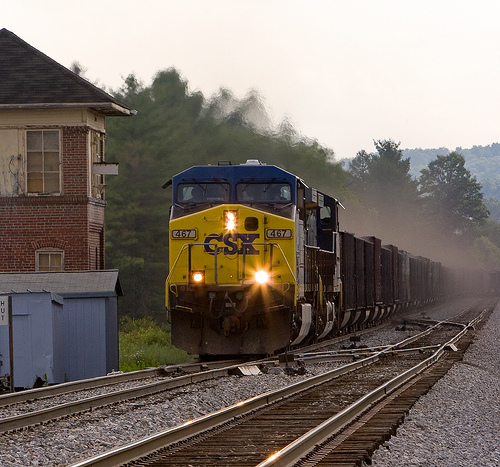Roger O. McClellan is regularly trotted out by coal export backers whenever they are trying to dismiss concerns about coal dust pollution. Yet last week in a Seattle Times opinion piece on pollution from coal transport, he called for a comprehensive review of coal export plans, including along railways:
Debate over the terminals should be grounded in scientific facts and analysis. Well-established scientific approaches should be used to evaluate any potential environmental and human-health impacts.
Scientific assessments such as the one being conducted by the Army Corps of Engineers should provide clarity and context for decisions by public officials. Science-based assessments should also identify any constraints needed to assure protection of the environment and public health. The public at large should encourage and, indeed, demand such assessments.
Good for him.
Although this is not the first time McClellan has said he supports a comprehensive review, such a plain public statement should come as a blow to coal export proponents.
When someone like McClellan calls for a comprehensive analysis of the dangers of coal dust escape from trains, it signals the true breadth of the opposition to fast-tracking approval for the proposed terminals. He has, after all, made a career of arguing for relaxed air quality standards, and he has often been paid by fossil fuel interests to provide expert testimony to government regulators. Yet as McClellan says, the Power Past Coal campaign and others are absolutely right to demand a region-wide assessment of the impacts of shipping coal.
Now I think it’s fair to say that McClellan is skeptical that coal dust escape is harmful. Fine. My own review of the science suggests that while the evidence is worrisome, it is spotty enough not to support definite conclusions.
We should all be able to agree, however, that the right course of action is a thorough scientific review of risks to the environment and human health—a review that includes a look at potential contamination along Northwest railways. I hope that the coal export backers will now come around on this point.
At the risk of nit-picking, however, the article did contain at least one factual error that should be corrected. He writes:
Coal from the Powder River Basin in Wyoming and Montana is currently being shipped by rail to ports in Washington state and Oregon… These terminals, which serve as a gateway to Asia, have been an important part of the regional economy for more than a century.
I’m really not sure where this comes from.
Neither Washington nor Oregon ship any coal to Asia. In fact, neither state has a coal terminal of any kind. Needless to say, then, coal ports are not an important part of the regional economy!
Maybe he’s mixed up about British Columbia’s Westshore Terminal? As I’ve documented, that terminal has been receiving modest volumes of US coal since about 2009, coal that does travel via railway in Washington. But even that doesn’t explain the “more than a century” bit because Westshore has only been around since 1970.
According to official figures, the volume of coal now traveling to Westshore—around 4 million tons if you believe US Customs and around 8 million tons if you believe the terminal—is miniscule compared to 100 million tons planned for proposed new terminals in Oregon and Washington. In other words, the region’s past experience with coal trains and coal dust is no guide at all to the future envisioned by coal terminal supporters.
Before the Northwest goes down that road, we should know more—a lot more—about the risks of coal and coal dust. That’s something that environmental activists and industry experts alike can agree on.









♖♆♖ JACOB ♖♆♖
Unfortunately, I feel that framing the issue merely in terms of coal dust is not enough for the local public. We HAVE to discuss climate change.
Bob Aegerter
The issues addressed by the public in the DEIS scoping sessions were much broader than the coal dust. We will continue to insist that all of the issues be adequately addressed.
Bob Aegerter
Coal is continuing to be shipped into Washington State for burning here. The electric generating station at Chehalis is the largest user. When I came to Bellingham in 1968 coal was delivered by rail for burning in local furnaces that had not be converted to natural gas.
Eric de Place
It’s at Centralia, but yes.
I think it’s the case now that less coal moving to Centralia these days than is moving across the Canadian border to the Westshore Terminal.
Paul Johanson
Dare we hope that a comprehensive review would also include examination of the likely contribution of expanded coal combustion to mercury and other atmospheric contaminants?
Leslie Johnson
Last weekend I worked at a household hazardous waste collection in Washougal. During the few hours we were there I watched three coal trains pass — hundreds of cars and nothing but coal on any of them. They weren’t covered and I could see some coal falling to the ground. This isn’t what we want anywhere along the Columbia River, let alone sending it to a country burning it for power. A good portion of the air pollution from that burning comes right back to us. Isn’t that a bit ironic?